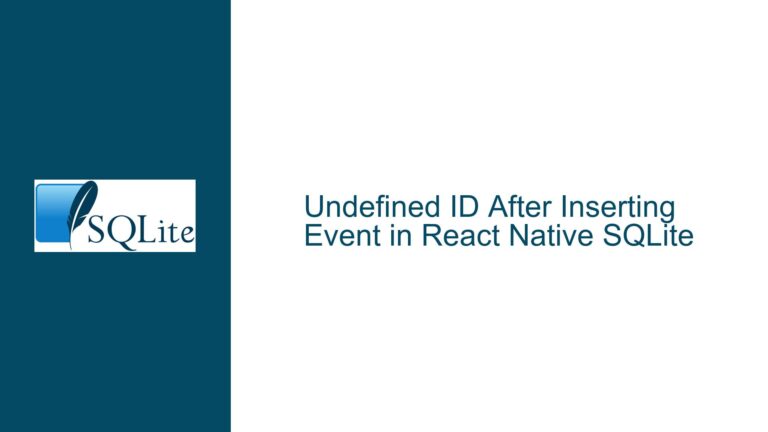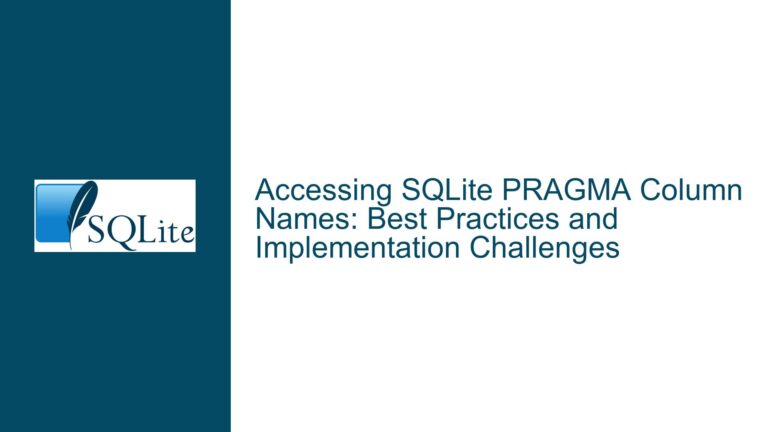Integer Overflow in sqlite3VdbeMemSetStr() with SQLITE_MAX_LENGTH=2147483647
Understanding the Integer Overflow in sqlite3VdbeMemSetStr()
The core issue revolves around integer overflows occurring in the sqlite3VdbeMemSetStr() function when SQLite is built with the -DSQLITE_MAX_LENGTH=2147483647 flag. This function is responsible for binding strings (both UTF-8 and UTF-16 encoded) to SQLite statements. The overflows manifest in two distinct scenarios:
UTF-16 String Binding: When binding a UTF-16 encoded string of size
0x80000000U(2,147,483,648 bytes), an integer overflow occurs within thesqlite3VdbeMemSetStr()function. This overflow results in a miscalculation of the string length, leading to undefined behavior and ultimately causing the program to abort.UTF-8 String Binding in SQLITE_TRANSIENT Mode: When binding a UTF-8 encoded string of size
0x7FFFFFFF(2,147,483,647 bytes) inSQLITE_TRANSIENTmode, another integer overflow occurs. This overflow causes a segmentation fault due to an invalid memory allocation size.
The root cause of these issues lies in the handling of large string sizes within the sqlite3VdbeMemSetStr() function. Specifically, the function fails to account for the upper limits of integer arithmetic when processing strings that approach or exceed the maximum value of a signed 32-bit integer (INT_MAX).
Root Causes of the Integer Overflow in sqlite3VdbeMemSetStr()
The integer overflows in sqlite3VdbeMemSetStr() can be attributed to several factors:
Inadequate Integer Range Checks: The function does not properly validate the size of the input strings against the maximum allowable size defined by
SQLITE_MAX_LENGTH. When the size of the string approaches or exceedsINT_MAX, arithmetic operations within the function result in integer overflows. For example, the calculation ofnBytein the loop for UTF-16 strings can exceedINT_MAX, leading to undefined behavior.Improper Type Casting: The function uses signed integers (
int) for calculations involving string lengths. When dealing with large strings, these calculations can overflow, especially when the size of the string is close toINT_MAX. The proposed fix suggests using unsigned integers (u32) for these calculations to avoid overflow.Incorrect Comparison Logic: The function includes a comparison check (
if( nByte>iLimit )) that does not account for the possibility of integer overflow. This check should be modified to compare against the unsigned integer limit (if( nAlloc>(u32)iLimit )) to ensure correct behavior when dealing with large strings.Memory Allocation Issues: The function attempts to allocate memory based on the calculated string size. However, due to the integer overflow, the allocated size can be incorrect, leading to segmentation faults or other memory-related errors.
Documentation Ambiguity: The current documentation for
SQLITE_MAX_LENGTHdoes not explicitly warn against setting it to2147483647(the maximum value for a signed 32-bit integer). This can lead to confusion and unintended behavior when developers attempt to push the limits of SQLite’s string handling capabilities.
Resolving the Integer Overflow in sqlite3VdbeMemSetStr()
To address the integer overflow issues in sqlite3VdbeMemSetStr(), the following steps and solutions are recommended:
Use Unsigned Integers for Length Calculations: Modify the function to use unsigned integers (
u32) for all calculations involving string lengths. This prevents integer overflow when dealing with large strings. For example, replace the loop for calculatingnBytewith the following:u32 nByteU; for(nByteU=0; nByteU<=(u32)iLimit && (z[nByteU] | z[nByteU+1]); nByteU+=2){} nByte = (int)MIN((u32)iLimit, nByteU);Update Comparison Logic: Change the comparison check to use unsigned integers. Replace
if( nByte>iLimit )withif( nAlloc>(u32)iLimit )to ensure correct behavior when dealing with large strings.Validate Input String Sizes: Add explicit checks to ensure that the size of the input string does not exceed the maximum allowable size defined by
SQLITE_MAX_LENGTH. This prevents the function from attempting to process strings that are too large to handle safely.Fix Memory Allocation Logic: Ensure that the memory allocation size is calculated correctly and does not overflow. Use unsigned integers for the allocation size and validate the size before allocating memory.
Update Documentation: Clarify the documentation for
SQLITE_MAX_LENGTHto warn against setting it to2147483647. Instead, recommend a slightly lower value (e.g.,2147483646) to avoid integer overflow issues.Test with Large Strings: Thoroughly test the modified function with large strings (both UTF-8 and UTF-16) to ensure that the integer overflow issues have been resolved. Use the provided test programs to verify the fixes.
Consider Alternative Approaches: If the above fixes are not sufficient, consider alternative approaches for handling large strings. For example, use a 64-bit integer for length calculations or implement a streaming interface for large strings to avoid loading the entire string into memory.
By implementing these fixes, the integer overflow issues in sqlite3VdbeMemSetStr() can be resolved, ensuring that SQLite can safely handle large strings without encountering undefined behavior or memory-related errors.
Detailed Explanation of the Proposed Fixes
1. Use Unsigned Integers for Length Calculations
The primary cause of the integer overflow is the use of signed integers (int) for length calculations. When the size of the string approaches or exceeds INT_MAX, arithmetic operations on signed integers can overflow, leading to undefined behavior. By using unsigned integers (u32), we can avoid this issue, as unsigned integers have a larger range and do not overflow in the same way as signed integers.
For example, the loop for calculating nByte in the UTF-16 case can be modified as follows:
u32 nByteU;
for(nByteU=0; nByteU<=(u32)iLimit && (z[nByteU] | z[nByteU+1]); nByteU+=2){}
nByte = (int)MIN((u32)iLimit, nByteU);
This ensures that the length calculation does not overflow and that the result is within the allowable range.
2. Update Comparison Logic
The comparison check if( nByte>iLimit ) is problematic because it does not account for the possibility of integer overflow. When nByte exceeds INT_MAX, the comparison may yield incorrect results. By changing the comparison to use unsigned integers (if( nAlloc>(u32)iLimit )), we ensure that the comparison is performed correctly, even for large values.
3. Validate Input String Sizes
Before processing the input string, the function should validate its size against the maximum allowable size defined by SQLITE_MAX_LENGTH. This prevents the function from attempting to process strings that are too large to handle safely. For example:
if (n > SQLITE_MAX_LENGTH) {
return SQLITE_TOOBIG;
}
This check ensures that the function does not proceed with processing a string that exceeds the allowable size.
4. Fix Memory Allocation Logic
The memory allocation size (nAlloc) should be calculated using unsigned integers to avoid overflow. Additionally, the size should be validated before allocating memory. For example:
u32 nAlloc = (u32)nByte + 1; // Ensure space for null terminator
if (nAlloc > (u32)iLimit) {
return SQLITE_TOOBIG;
}
pMem->z = sqlite3Malloc(nAlloc);
if (!pMem->z) {
return SQLITE_NOMEM;
}
This ensures that the allocated size is correct and that memory allocation does not fail due to an invalid size.
5. Update Documentation
The documentation for SQLITE_MAX_LENGTH should be updated to warn against setting it to 2147483647. Instead, recommend a slightly lower value (e.g., 2147483646) to avoid integer overflow issues. This provides a safety margin and prevents developers from encountering undefined behavior when pushing the limits of SQLite’s string handling capabilities.
6. Test with Large Strings
Thoroughly test the modified function with large strings (both UTF-8 and UTF-16) to ensure that the integer overflow issues have been resolved. Use the provided test programs to verify the fixes. For example:
// Test program for UTF-16 strings
#include <assert.h>
#include <sqlite3.h>
#include <stdio.h>
#include <stdlib.h>
#include <string.h>
int main()
{
sqlite3* db = NULL;
sqlite3_stmt* stmt = NULL;
char* bigtext;
int rc;
rc = sqlite3_open_v2(":memory:", &db, SQLITE_OPEN_READWRITE, NULL);
assert(rc == SQLITE_OK);
rc = sqlite3_exec(db, "CREATE TABLE t(c)", NULL, NULL, NULL);
assert(rc == SQLITE_OK);
rc = sqlite3_prepare_v2(db, "INSERT INTO t VALUES (?)", -1, &stmt, NULL);
assert(rc == SQLITE_OK);
bigtext = malloc( 0x80000000U + 2 );
assert(bigtext);
memset(bigtext, 1, 0x80000000U );
bigtext[0x80000000U + 0] = 0;
bigtext[0x80000000U + 1] = 0;
rc = sqlite3_bind_text16(stmt, 1, bigtext, -1, SQLITE_STATIC);
assert(rc == SQLITE_OK);
return 0;
}
This test program should no longer result in an integer overflow or program abort when the fixes are applied.
7. Consider Alternative Approaches
If the above fixes are not sufficient, consider alternative approaches for handling large strings. For example, use a 64-bit integer for length calculations or implement a streaming interface for large strings to avoid loading the entire string into memory. This can be particularly useful for applications that need to handle extremely large strings or blobs.
By following these troubleshooting steps and implementing the proposed fixes, the integer overflow issues in sqlite3VdbeMemSetStr() can be resolved, ensuring that SQLite can safely handle large strings without encountering undefined behavior or memory-related errors.






